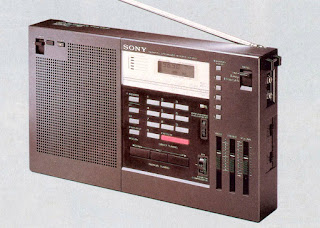From about 1920 to 1940 radio was
the most common electronic device familiar to the general public. By the early 1940s radio was so popular that
hardly an American family didn’t own at least one. After WWII the public was exposed to
television, radar, two-way communications, and a host of lesser publicized
electronic devices. Many entertainment electronic
devices competed with radio, especially television. But, despite the competition the public still
found radio useful. By the 1950s
transistor portables and car radios sparked a true renaissance in radio
listening with on-the-go portability being the catalyst.
During all this time a few big
companies and many smaller companies supplied the American appetite for radios
of all types. The big names in radio
included Philco, RCA, Emerson, and Zenith.
Zenith was an old line radio company dating back to the 1920s. It considered itself a “premium” radio
supplier. One of their slogans was, “The
quality goes in before the name goes on”.
Zenith radios were a “cut above” the other radios on the market. One of their most popular radios was the Transoceanic portable. The Transoceanic
was a large portable radio capable of receiving many stations other than the
usual stations on the AM dial.
Originally, the additional stations were on the so called “short wave”
frequencies.
The original Transoceanic was known
as the Clipper Transoceanic and was introduced by Zenith prior to WWII. The radio was ahead of its time for a portable. The war years gave it a lot of positive
publicity. With its short wave
capabilities it provided world wide coverage of news and entertainment. And so, was in great demand by overseas
soldiers. After the war Zenith redesigned the Transoceanic and sold many versions
of it until 1980. That’s almost forty
years for a radio that was continuously improved by Zenith culminating in the
twelve band R7000 version. Over the
forty year life of the Transoceanic its panache as “The Royalty of Radios” kept
it in the top tier of portable radios for those wishing to own the best. Many considered the Transoceanic portable a
status symbol. But, that was not to last very long.
In 1953 the Sony Corp. made a
fortunate move when they bought a license for use of the recently invented
transistor from the Western Electric division of AT&T. The rest is history. Sony and then many other Japanese companies
went on to design and sell transistor radios at prices that American radio
manufacturers could not match. Consequently,
by the late 1950s most American radio manufactures ceded the radio market to
the Japanese. Zenith Corp. was one of
the few continuing to make radios in the U.S. But even Zenith was moving away from radio
production into more lucrative and complex electronic devices such as
television and military electronics.
The last version of the Zenith
Transoceanic was introduced in 1979.
Known as the R7000, it was just a refinement of the previous Royal
7000. But, the refinement was minimal.
The “famous” Zenith
Transoceanic model R7000
In the meantime the Sony Corp. was
improving their multi-band radio technology.
And, in 1980 Sony introduced the ICF-2001 radio, a truly revolutionary
radio and represented a great leap
forward in radio technology. The
ICF-2001 had a sophisticated phase lock loop (PLL) tuning mechanism with
digital display. Stations could be tuned
to the exact frequency of the desired station.
Sony priced the ICF-2001 at $299, which was much less than the $395.95
Zenith asked for an R7000. The Sony radio was not only cheaper, it was
lighter, more compact, and more “modern“ looking compared to the staid design
of the Zenith R7000.
The equally famous
Sony ICF-2001
Of course the inevitable happened. The Sony ICF-2001 massively outsold the
Zenith R7000. The Zenith Transoceanic
was obsolete and essentially a commercial flop.
Sony went on to design and sell a constantly improving family of
portable multi-band radios. And is still
producing and selling them to this very day.
Zenith gave up on radio and a few years later had to give up on most
consumer electronics including television.
By 1999 Zenith filed for Chapter 11 bankruptcy. It was an ignominious end to one of the great
American electronic manufacturers. In
1981 Zenith’s last R7000 radio was assembled in Korea from American parts.


No comments:
Post a Comment